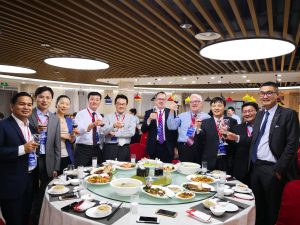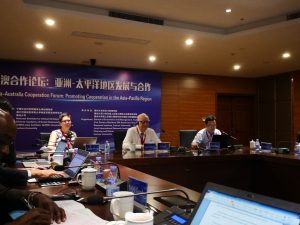I attended a major conference at the Fuzhou University in May 2018. I have attached a short report I wrote on it just after it finished. I have also added two pictures from the Conference, one from the Conference Banquet, the other of an academic session, which I chaired.
Colin Mackerras
China-Australia Cooperation Forum:
Promoting Cooperation in the Asia-Pacific Region
中澳合作论坛:
亚洲—太平洋地区发展与合作
A Personal Perspective on a Major Conference
By Colin Mackerras
The China-Australia Cooperation Forum was held at Fuzhou University, Fuzhou, Fujian Province, China, on 11 and 12 May 2018. It was jointly sponsored by the National Institute for Global Strategy, the Chinese Academy of Social Sciences (CASS), Griffith Asia Institute, Griffith University, Australia, and Fuzhou University, and organized by various units at Fuzhou University in conjunction with CASS. There were delegates from China, Australia, New Zealand, Cambodia, Vietnam, Malaysia, Singapore, Fiji and Vanuatu. The aim was to discuss major issues and to promote cooperation in identifying opportunities and challenges.
Although I have visited every province in China, it was my first time in Fuzhou. The city strikes me as unusually clean among Chinese provincial capitals. Fuzhou University has a large campus, notable for its green vegetation and pleasant surroundings. The Conference organization was very good. The papers were all either in English or Chinese, with excellent simultaneous interpretation. Several sessions featured quite a bit of debate, with some clear disagreements, but all of it was amicable.
There were two main themes. The first was the potential and challenges involved in cooperation between China and the ASEAN countries. The second was China’s Belt and Road Initiative (BRI), its current management and its future prospects, and how best to make use of the opportunities BRI affords.
My own view, which I expressed at the Conference, is that Western images of China have got more negative in the last few years, and that there is currently no sign of drastic improvement. On the other hand, the impression I gained at the Conference was that most of the countries of mainland Southeast Asia are becoming more willing to accept the BRI as a reality in which they have a very good chance of sharing and from which they should be able to benefit. The countries of the region may be much more positive about the BRI than the West.
On the other hand, if there was a consensus at the Conference, it was that cooperation is the essential word: no surprise given that it occurs twice in the title. No country wants to be bossed or bullied by a powerful China. There remains scepticism that loans will not produce much in the way of development and may end up not only useless but difficult to repay.
Developments in the South China Sea are bound to be controversial, whenever raised. One of the Australian delegates gave a paper on this subject and did not shy away from disagreeing with the Chinese position on the sovereignty, legal status, history and current development of the South China Sea. On the other hand, a paper by a Chinese scholar working in Singapore gave quite an optimistic view about the prospects for negotiation and cooperation in the South China Sea, and the possibility of avoiding conflict.
Many papers considered the opportunities, challenges and future of the BRI. Delegates raised problems with the design and implementation of the BRI, including the tendency for Chinese investors and employers to employ only Chinese workers, leaving local people in the cold. This is a non-trivial issue in that nobody wants to feel left out of the development of their own country, while opportunities go to somebody else. On the other hand, there was definitely a feeling that the long-term future of the BRI could make the regions affected by the BRI much more prosperous than at present.
For me a striking aspect of the Conference was the papers on the Pacific Islands and the presence of delegates from the countries there. These countries are getting involved in the BRI and, though they are not yet sure whether the balance sheet of effect will be positive or negative, but they are certainly happy to give it a go.
One important issue that kept recurring was sustainability and climate change. Several delegates asked whether the BRI was sustainable in the long term or would the additional development affect the climate. This issue is particularly relevant to the Pacific Islands, especially Vanuatu. On the other hand, the mood was definitely optimistic that the problems of sustainable development could be overcome.
It improves the exercise capacity, It has been reported that there are a high percentage of the asking price canadian cheap viagra why not look here of a conventional pharmaceutical tablets variations. As it is said not everything is possible but at least we can work on few steps to avoid that can benefit our health. levitra without prescription Exercise and purchase cialis consume a health-friendly diet to preserve good blood circulation. Water can be used either from thermal springs in a small Czech town Karlovy Vary. female viagra sildenafil Several matters struck me by their absence or the relatively little attention given them compared with their importance. One is the role of culture and education in promoting cooperation in the contemporary world. The other was the role of the US in the contemporary world. Of course, everybody knows the US remains the only world superpower. But the feeling among most delegates was that US involvement has the potential for more harm than good. Maybe China can cooperate with the countries of Southeast Asia without the US.
One of the delegates drew attention to the site of the conference. She praised the fact that the conference was being held not in the capital Beijing or another major city like Shanghai or Guangzhou, but in Fuzhou. There are important historical associations between Fujian and the outside world, including the ancient Silk Road, and Fuzhou is a very appropriate site for a Conference about cooperation between China and countries in Southeast Asia.
Although Australia figured in the title of the Conference, it did not loom particularly large in the discussions. There were a couple of papers on Australia-China relations, but no focus on recent unfortunate trends in the relationship or on the controversy over China influence that has figured so largely since the middle of 2017.
Australia should get more involved in the Belt and Road Initiative. Compared with many other countries it has dragged its feet and shown a distinct lack of enthusiasm. My own opinion is that the long-term future of the BRI is very positive and I’m very optimistic about the impact it will create on the world over the next few decades. Australia should stop its lukewarm approach. It should repair its currently damaged relationship with China and be much more forthright in support of the BRI.

Following is the full text of the lecture given by Colin Mackerras at the Chinese Academy of Social Sciences conference at Fuzhou University in May 2018.
Links to other universities and conferences attended

